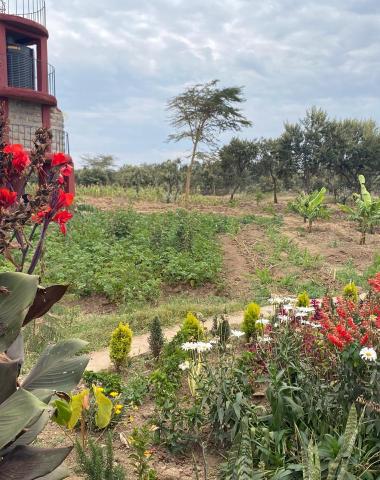On 23 June 2025, the Agroecology Promotion Programme (APP) hosted its first Learning Event of the year, bringing together around 60 participants from 28 organisations across Sub-Saharan Africa, Southeast Asia, and various global networks. This diverse and engaged group convened to exchange knowledge and practical insights on Participatory Guarantee Systems (PGS)—a topic selected through a democratic voting process by APP partners.
The topic of PGS emerged as the top priority during a round of voting held at the East African Agroecology Conference in Nairobi (25–28 March 2025). APP partners identified PGS as highly relevant to their work in advancing agroecological approaches and farmer-led certification systems.
To support focused dialogue, participants were divided into four breakout groups to explore key dimensions of PGS: Market Access, Advocacy and Policy Engagement, Standard Setting, and Financial Sustainability.
Key insights per breakout group are summarised as follows:
Participants shared that demand for PGS-certified fresh produce is growing, particularly in local and mobile markets, trade fairs, and emerging organic sections in supermarkets across East Africa. However, processed organic products still rely heavily on peer networks. School feeding programs and direct marketing through farmer-led sales points were identified as promising market avenues.
Key challenges include unfair competition from sellers misusing organic labels, lack of formal recordkeeping, and consumer confusion due to inadequate traceability. Supermarkets often require dual certification, adding to costs. To address this, innovations like blockchain are being explored.
To strengthen market access, participants emphasised the need for public awareness, clearer quality communication (especially via social media), and internal coordination within PGS groups to avoid overproduction. Marketing committees and training in packaging, labeling, and consumer expectations were highlighted as essential to success. Building functional internal systems and improving access to timely market information were seen as critical steps for growth and resilience.
Discussions highlighted the importance of using real-life evidence, such as improved farmer income or reduced health risks, to advocate for PGS adoption. In Cambodia, while national certification systems exist, they are often inaccessible, prompting the use of locally adapted PGS models that certify "safe" rather than strictly organic produce.
Voluntary participation and farmer ownership were seen as fundamental to sustainable PGS implementation. Some cooperatives in Cambodia have created their own standards through community discussions, with certification limited to members who are genuinely committed.
PGS was recognised not just as a certification system but as a participatory framework that adapts to various production systems. While Cambodia has made some progress with government support for local markets and awareness campaigns, reliable demand remains a challenge. Globally, countries like India and the Philippines offer top-down PGS examples, while Latin America shows strong, community-driven models that stay truer to participatory values.
There was broad consensus that PGS standards must be rooted in local realities, co-developed with farmers, and flexible enough to reflect diverse practices. In Madagascar and Cambodia, early-stage efforts focus on collaborative creation of terms and context-specific rules, enabling inclusivity and practicality.
Some countries, like Madagascar, have formally integrated PGS into national organic strategies, creating synergies with peer-reviewed models. Elsewhere, like Cambodia, the complexity and cost of official certification have led to more accessible, locally driven alternatives. Participants emphasized the need to document PGS practice into knowledge products for advocacy.
Internationally, Latin American countries provide models for mutual recognition and government-civil society collaboration, while East Africa’s Kilimohai mark demonstrates the potential for regional standard harmonisation.
Challenges include inconsistent farmer recordkeeping, limited lab testing capacity, and a lack of localised research for evidence-based standard design. Finally, integrating PGS with broader food system goals, such as food safety and market access, was identified as essential, particularly in countries like South Africa where PGS is expanding but still reliant on voluntary contributions and technical support.
Participants agreed that while donor support is valuable for launching PGS initiatives, long-term sustainability hinges on local ownership and financial independence. In South Africa and Rwanda, donor-led models faced collapse once external funding ended, underscoring the need for early farmer buy-in and business-minded planning.
The South African aggregator model was shared as a financial design that allows groups to reach cost recovery through economies of scale. Key expenses, such as group coordination, supply chain support, and practitioner compensation, must be budgeted realistically. Some groups are now paying for certification services, marking a shift toward market-based sustainability.
PGS is increasingly viewed not only as a certification mechanism but also as an investment tool. In East Africa, ethical financing and technical assistance are helping integrate PGS into value chains. Madagascar’s national strategy positions PGS as a cost-effective alternative to third-party certification, particularly for producer groups.
Limited access to domestic funding remains a concern. Efforts are underway to map international funding sources and explore blended finance models combining trade income, public-private partnerships, and grassroots investment.
Finally, capacity building remains central. PGS serves as both a training platform and a tool for strengthening agroecological value chains, especially in Kenya and Uganda. Ownership by farmer groups, paired with diversified roles (traders, processors, marketers), is essential for PGS to become a lasting part of local food systems.
In the closing session, participants reflected on how PGS is more than a certification tool, but a transformative process rooted in community ownership, adaptability, and its unique ability to connect diverse actors across the food system.
PGS is not just a certification tool, but also a transformative process. Its strength lies in community ownership, adaptability, and its ability to bridge food system actors, farmers, consumers, processors, and institutions.
Senior Manager Global Academy
Looking ahead, the next APP Learning Event will be held between October and November 2025, and will focus on the Post-Malabo Kampala Declaration, which sets the direction for the next phase of the Comprehensive African Agricultural Programme (CAADP) Strategy and Action Plan 2026-2035.
